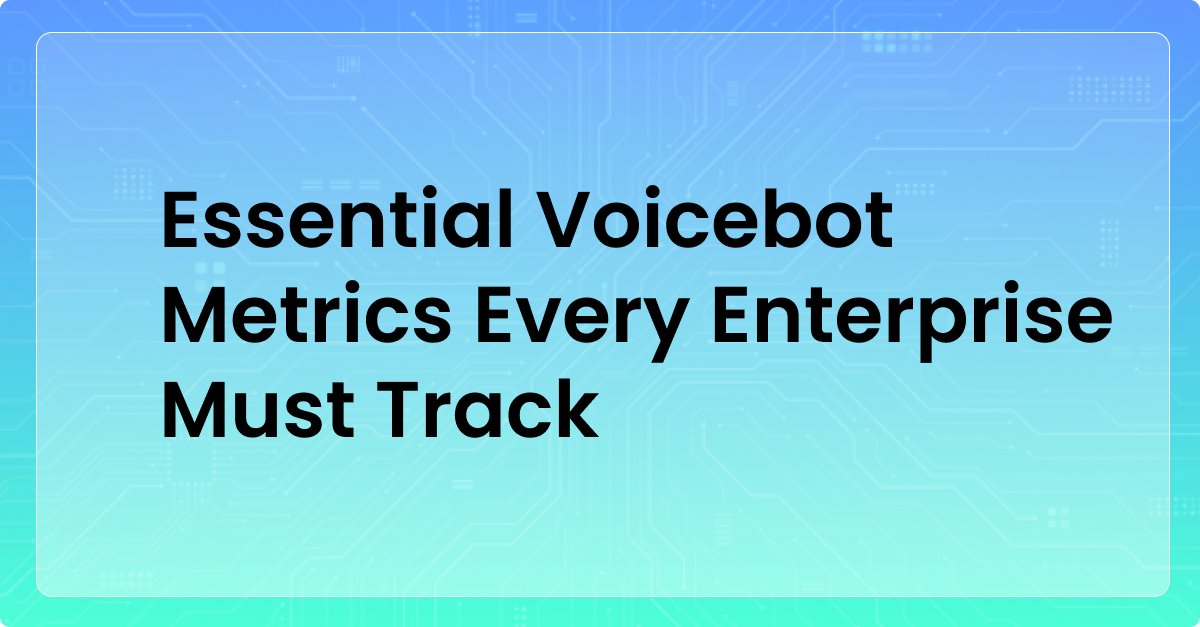In the fast-paced digital world, voicebots are revolutionizing customer service, making interactions effortless. But with voicebots handling sensitive personal and financial data, privacy and security cannot be afterthoughts. They form the backbone of not just compliance, but customer trust.
This blog dives deep into the critical aspects of data protection, privacy laws, and security protocols that voicebots must adhere to, explained clearly and engagingly for professionals across industries, especially BFSI, where the stakes are highest.
Why Data Privacy and Security Are Non-Negotiable in Voicebots
Voicebots deal with personal info like names, account details, voiceprints, and payment info, making them prime targets for cyber risks if not properly protected. A data breach here can mean financial loss, legal penalties, and a reputation hit that’s hard to recover from.
Leading privacy laws worldwide like India’s RBI regulations, Europe’s GDPR, and the US’s CCPA demand strict control over how personal data is collected, stored, and processed. Violations don’t just cost money; they erode customer confidence.
Privacy First: What Businesses Must Know
- Collect only what matters: Don’t ask for or store unnecessary info. Keep data sets lean.
- Get clear consent: Always tell users what you’re capturing and why, and allow easy opt-outs.
- Stay transparent: Make your data policies easy to find and understand, no tech jargon.
- Define strict retention policies: Keep data only as long as needed, then delete securely.
These principles keep your voicebot running clean and keep customers feeling safe
Security Essentials Voicebots Need
Encrypt All the Way
From voice capture to data storage, encryption is the guard that keeps your conversations private. Whether in transit or resting on servers, data must be shielded with strong encryption standards like AES-256.
Strong User Authentication
Multi-factor authentication: voice biometrics combined with PINs or OTPs verifies that callers are who they say they are. This dual layer makes impersonation extremely difficult.
Tight Access Controls
Only a handful of vetted people and systems should access sensitive data. Role-based access policies help limit exposure even internally.
Constant Vigilance with Monitoring
Voicebots with AI-powered monitoring spot suspicious behavior during calls, like voice spoofing or transaction anomalies, enabling instant action before fraud escalates.
Secure API Connections
Voicebots don’t work alone, they connect to payment gateways, account systems, CRMs. These integrations must be secured with strong authentication and encrypted communication.
Compliance Is Built-In, Not Optional
For BFSI and healthcare sectors, voicebot compliance is an exhaustive checklist:
- RBI’s record-keeping and scripting mandates
- GDPR rights for data control and deletion
- PCI DSS for voice-based payment security
- HIPAA protection for medical data
Modern voicebot platforms offer automated audit trails, consent capture, and compliance alerts to keep you one step ahead.
Designing Voicebots with Privacy by Default
Security should be a built-in mindset, not an afterthought. That means:
- Encrypting data by design
- Minimizing data collection
- Anonymizing datasets for AI training
- Regular security audits and patching
- Educating your teams on best practices
Putting privacy first builds not just secure products but loyal customer relationships.
The Stakes: Why Failure Isn’t an Option
A single breach or compliance slip can tank your brand reputation. Worse, customers will lose faith, not just in your bot, but your entire business. Investing in robust security isn’t just smart; it’s survival.
FAQs
Q: How do voicebots protect personal and financial data during interactions?
A: Voicebots employ end-to-end encryption protocols such as AES-256 and TLS to secure voice and data transmissions. This ensures that sensitive information like Aadhaar numbers, bank details, or voiceprints is unreadable if intercepted.
Q: What authentication methods ensure only authorized users access voicebot services?
A: Multi-factor authentication is common in Indian voicebots, combining voice biometrics, one-time passwords (OTP), and PINs to verify caller identity, minimizing risks of fraud and identity theft.
Q: How do voicebots comply with Indian regulations like RBI guidelines and the upcoming DPDPA?
A: Leading platforms automate call recording, script adherence, real-time consent capture, and data localization to meet RBI and “Digital Personal Data Protection Act” (DPDPA) requirements, ensuring compliant operations.
Q: Are voice calls and data stored permanently? What are the retention norms?
A: Data is usually stored only as long as mandated by law or business need, often between 6 months to 5 years for BFSI, as per RBI guidelines and then securely deleted or anonymized. Users also have rights to request deletion under DPDPA.
Q: How do voicebots securely handle India’s multilingual environment?
A: Regardless of language: Hindi, Tamil, Telugu, Marathi, or others, voicebots apply uniform encryption, access controls, and compliance protocols, ensuring consistent privacy protections across all dialects.
Q: How can voicebots detect and prevent fraudulent activities during calls?
A: AI-powered voice analytics monitor caller voice patterns and behavioral signals in real time to detect anomalies like spoofing or suspicious transaction requests, triggering alerts and additional verification steps.
Q: What transparency measures are in place for users regarding data usage?
A: Voicebot platforms provide audible disclosures, easy-to-access privacy policies, and consent mechanisms so users understand what data is collected and how it’s used, aligning with Indian regulatory expectations.
Q: How do companies continuously improve voicebot privacy and security?
A: By leveraging analytics and machine learning on interaction data, companies identify vulnerabilities, enhance authentication models, and update compliance processes to respond to evolving threats and regulations.
Conclusion
Strong data privacy and security aren’t a bonus, they’re the ticket to earning real customer trust in India’s digital-first world.
The best voicebots do more than just answer queries, they encrypt every word, get your clear consent, and stay one step ahead of cyber threats.
With RBI and DPDPA rules raising the bar, future-ready businesses are doubling down on transparency, compliance, and AI-powered fraud detection.
Build your voicebots on these principles, and your customers will notice the difference.
Want to see secure voice automation in action? Check out our full guide or book a demo and experience the future today.
